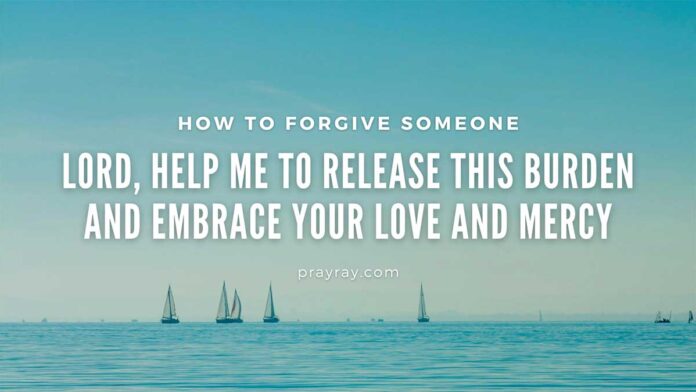Who hasn’t felt the pain of being judged or criticized negatively? I’m sure there have been situations where you’ve been falsely accused, mistreated, or even abused. Some of you may have experienced a grievance so deep that you have carried it in your heart for years. And how to forgive someone if your heart is unwilling and unable to move toward healing and reconciliation?
Therefore, in this article, you will learn a step-by-step strategy that influences our psychology toward forgiveness and reconciliation and how to invite God, the true healer of the soul, into the process.
Understanding Forgiveness
The Christian definition of forgiveness is given to us by Thomas Aquinas: “Forgiveness is an act of the will, which involves the deliberate decision to let go of resentment and the desire for revenge.” (anselm.edu)
Forgiveness is, therefore, a conscious decision to let go of feelings of resentment, inner anger, and desire for revenge against the person who caused them, whether that person is worthy of forgiveness or not.
In Christian ethics, forgiveness is not just an act of goodwill but an obligation from God because the Bible says: “Forgive, and you will be forgiven.” (Luke 6:37)
So, two factors are at play here: human action and God’s grace.
It should also be noted that forgiveness is not a justification for the wrong done or an attempt to forget it. Forgiveness is about the liberation of the heart; it is a position of life.
The Benefits of Forgiving
Forgiveness as a life position creates the conditions for inner peace, helps us to focus on our lives, and renews our relationship with God.
Notably, the fruits of forgiveness positively affect our physical and mental health. As it removes the stress caused by unforgiveness, there is a corresponding reduction in anxiety, a normalization of blood pressure, and a strengthening of the immune system. In addition, the process of forgiveness increases self-esteem and makes relationships healthier.
The most important benefit is that forgiveness enables us to be in tune with God’s will, which opens our hearts to his grace and healing power.
The Challenge of Holding a Grudge
When we consider how to forgive someone, we must remember that God is a loving Father. Therefore, He calls us to forgive, not only because unforgiveness serves evil and closes the door to His grace but also because forgiveness serves our well-being.
Unforgiveness is a real challenge to our mental and physical health. Resentment creates and sustains stress that is not directly expressed but contextual and may not be immediately apparent.
It can affect our well-being so much that sleep can be disturbed, blood pressure can fluctuate, anxiety, depressed mood, and sometimes suicidal thoughts can occur. This leads to irritability, nervousness, and fits of anger. This inevitably hurts our relationships with other people.
It can also lead to a breakdown in our moral principles and spiritual beliefs, anger and accusations against God, etc.
How to Forgive Someone
Forgiveness is a commitment to change. Change is a process. And that means that the process needs to be carried out, sustained, learned, and, if it fails, started again.
Steps to Forgiveness
Below is a step-by-step process of letting go:
- Acknowledge the Hurt. Recognize the pain and accept that it has impacted your life. In doing so, you start the healing process.
- Understand Forgiveness. Realize that forgiveness doesn’t mean forgetting or excusing the harm. It’s about letting go of the hold it has on your life.
- Empathize. Try to see the situation from the other person’s perspective. Consider their circumstances and reflect on times you’ve been forgiven.
- Pray for Strength. Ask God to give you the strength to forgive. Remember, forgiveness is a central theme in Christianity, reflecting God’s grace towards us.
- Decide to Forgive. Forgiveness is a choice. It’s a commitment to let go of resentment and embrace peace.
- Seek Support. Join a support group, talk to a counselor, or confide in a spiritual leader. Sharing your journey can be incredibly healing.
- Release the Power of the Offender. Forgiveness allows you to regain the control that the person and the situation have had over your life.
- Revisit Forgiveness. Understand that forgiveness is a process. Some hurts may need to be forgiven repeatedly.
When Forgiveness is Hard
It is often difficult to forgive, especially in cases where the abuser does not admit his guilt and does not repent. But it would be best to focus not on him but on yourself and the processes inside you.
If you fail to forgive, remember again and again that forgiveness is a process. “Then Peter came to Jesus and asked, ‘Lord, how many times shall I forgive my brother or sister who sins against me? Up to seven times?’ Jesus answered, ‘I tell you, not seven times, but seventy-seven times.'” (Matthew 18:21-22)
Work on yourself:
- Practice empathy.
- Try to look at the situation from the outside neutrally.
- Imagine how you would have acted in a similar situation.
- Remember situations where you were wrong and were forgiven.
- Write a journal and note down your thoughts on this issue.
- Talk to someone else about your state, and ask for advice from a person you trust.
- Seek help from a psychologist.
Work together with God:
- Pray for the strength and desire to change.
- Forgive yourself. Remember that the process of forgiveness includes forgiving the offender and yourself.
- Read the Bible, especially the passages that reveal God’s mercy.
- Pray for your offenders. It can be challenging, but it’s essential to take this step.
- Entrust the entire process of resentment and forgiveness into God’s hands.
- Start attending a prayer group at your church to find community support.
Unfortunately, forgiveness does not happen overnight. Often, it takes months. Therefore, be patient, do not stop praying, trust in God, and have hope.
Does Forgiveness Guarantee Reconciliation?
Forgiveness does not always lead to reconciliation. Sometimes, reconciliation is not possible or appropriate. However, forgiveness is about your peace and well-being, not necessarily about continuing a relationship.
Related article: Prayer for Forgiving Yourself
Forgiving and Not Forgetting
You often hear the expression that time heals. This saying means that the hurt and pain experienced are forgotten over time. However, this implies that the wound still exists; it hasn’t healed and just doesn’t hurt as much anymore.
Therefore, when considering how to forgive someone, we are talking about healing the wound, not hiding it from sight.
If You’re the One Seeking Forgiveness
Unfortunately, just as others hurt us, we also hurt others. No one is perfect, and this is understandable. Therefore, if you are the one who needs forgiveness, follow the principle stated by Jesus: “The truth will set you free” (John 8:32).
This means do not lie to yourself or others and acknowledge a mistake. Express regret for it. Without extensive justifications, ask for forgiveness.
But keep in mind that you cannot force another person to forgive you. As you can see from this article, forgiveness is a lengthy process. There is a sure path to be taken before deciding to forgive. But do not be disheartened; you have taken the first and most important step by acknowledging your guilt and asking for forgiveness. Now, all that remains is to wait.
Conclusion
Forgiveness is the path to inner healing and peace. Often, hurt and unforgiveness are the unnoticed factors that destroy our lives. By choosing forgiveness, you align yourself with God’s will, at the same time opening yourself to His grace, healing, and reconciliation.
God bless you all!












